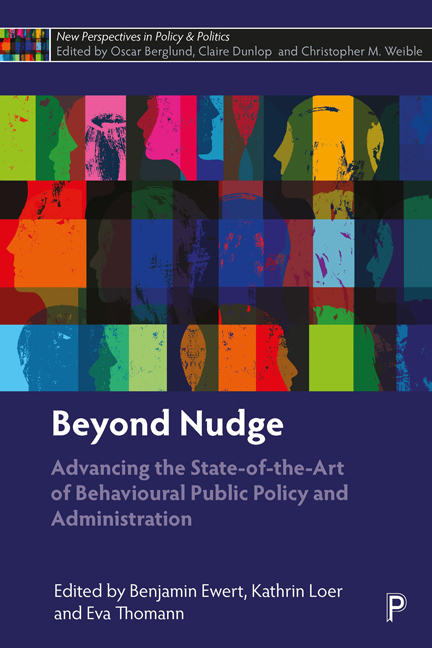Book contents
- Frontmatter
- Contents
- List of figures and tables
- Notes on contributors
- Acknowledgements
- 1 Beyond nudge: advancing the state-of-the-art of Behavioural Public Policy and Administration
- 2 Advancing behavioural public policies: in pursuit of a more comprehensive concept
- 3 A behavioural model of heuristics and biases in frontline policy implementation
- 4 Who are behavioural public policy experts and how are they organised globally?
- 5 Why nudge sometimes fails: fatalism and the problem of behaviour change
- 6 Behavioural insights teams in practice: nudge missions and methods on trial
- 7 Can street-level bureaucrats be nudged to increase effectiveness in welfare policy?
- 8 What motivates street-level bureaucrats to implement the reforms of elected politicians?
- 9 How can better monitoring, reporting and evaluation standards advance behavioural public policy?
- 10 Conclusion
- Index
8 - What motivates street-level bureaucrats to implement the reforms of elected politicians?
Published online by Cambridge University Press: 28 March 2024
- Frontmatter
- Contents
- List of figures and tables
- Notes on contributors
- Acknowledgements
- 1 Beyond nudge: advancing the state-of-the-art of Behavioural Public Policy and Administration
- 2 Advancing behavioural public policies: in pursuit of a more comprehensive concept
- 3 A behavioural model of heuristics and biases in frontline policy implementation
- 4 Who are behavioural public policy experts and how are they organised globally?
- 5 Why nudge sometimes fails: fatalism and the problem of behaviour change
- 6 Behavioural insights teams in practice: nudge missions and methods on trial
- 7 Can street-level bureaucrats be nudged to increase effectiveness in welfare policy?
- 8 What motivates street-level bureaucrats to implement the reforms of elected politicians?
- 9 How can better monitoring, reporting and evaluation standards advance behavioural public policy?
- 10 Conclusion
- Index
Summary
Bureaucratic organisations are often expected to run according to rules (Crozier, 1964; Weber, 1974). Political science research has offered optimistic views regarding political control of the bureaucracy by focusing on how to control bureaucrats rather than on whether to control them. An extensive literature on political control of the bureaucracy discusses mechanisms of delegation and accountability from inside and outside the bureaucracy and highlights the role of principals rather than that of agents (for example, McCubbins and Schwartz, 1984; Epstein and O’Halloran, 1999; Huber and Shipan, 2002; Lee, 2020). However, what actually happens on the agent side of the principal–agent relationship, particularly on the front line, seems to deviate from the political control arguments.
In reality, public employees on the front line are in a position where they intrinsically exert discretion in policy implementation. Lipsky’s (1980/ 2010) seminal work suggests that the discretion granted to street-level bureaucrats (SLBs) and their relative autonomy from principals create room to be filled by their own decisions which, in turn, are influenced by street-level factors. Although elected politicians do play a role in changing agency policies and influencing policy outcomes (Scholz and Wood, 1998; Lewis, 2008; Lee and Park, 2020), public administrative research has provided limited evidence of political influences on the actions of SLBs (Brehm and Gates, 1997; Riccucci et al, 2004; Riccucci, 2005). In a word, since Lipsky’s observation of SLBs’ behaviour, this view has been well accepted by subsequent research.
The main question is, then, what affects SLBs’ decisions? An extensive literature on SLBs’ implementation of policy has examined a variety of factors, ranging from bureaucrats’ attitudes and knowledge concerning their tasks (Sandfort, 2000; Meyers and Vorsanger, 2003), the characteristics of the implementing organisations (Lynn et al, 2001; Hill and Lynn, 2004; Brodkin, 2007; 2011), to contextual factors related to workloads and external pressures (May and Winter, 2009). Regarding political factors, although their influence over SLBs’ implementation is found to be relatively muted, it is still important to understand why there is variation in the extent to which SLBs respond to their elected politicians across individuals in a given institutional context.
- Type
- Chapter
- Information
- Beyond NudgeAdvancing the State-of-the-Art of Behavioural Public Policy and Administration, pp. 149 - 171Publisher: Bristol University PressPrint publication year: 2023

